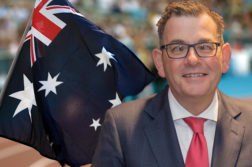Poor old Wayne Swan. He runs an economy the envy of most of the world. He’s pulled off a delicate balancing act between economic stimulus when the economy needed it, and rapid fiscal consolidation when the budget needed it. He’s delivered hard-won wins for the most vulnerable, such as tax cuts for low-income earners and an increase in the base rate of the pension. He’s displayed the kind of political courage that politicians like to say they have, but rarely display. He’s even won Euromoney’s Finance Minister of the Year gong.
What’s that? You don’t think Wayne Swan’s any good? You’re not alone. A large body of opinion poll data tells us that voters do not believe the Australian economy is in good shape. This is especially true for Coalition voters, who are far more inclined to the pessimistic view than Labor voters.
There’s no plausible economic reason for this, by the way; Liberal and National Party voters live and work in the same economy as their Labor and Green-voting cousins. Yet they seem to inhabit an entirely different economic universe, in which consumer confidence is low, the costs of living are rising inexorably and the economic outlook is grim.
June’s Newspoll asking Australian voters for their views on their standard of living illustrates the point nicely. 50 per cent of those surveyed thought that their standard of living in six months time would "stay about the same", 36 per cent thought things would get worse, and only 12 per cent thought things were on the improve.
But this overall picture of pessimism conceals some stark differences between conservative and progressive voters. For those voting Labor, optimism and pessimism was more finely balanced. 14 per cent thought things would improve and 20 per cent thought things would get worse. Among Coalition voters, pessimism reigned. Only 8 per cent thought their standard of living would be higher in six months time. A whopping 48 per cent thought their standard of living would decline.
Let’s zoom back and remind ourselves about what’s has been happening in the Australian economy lately. It’s a story almost completely at odds with this pessimism. Australia’s official economic statistics paint a rosy picture of an economy growing at a healthy clip. The latest GDP data from the Australian Bureau of Statistics shows the economy growing at 3.6 per cent. Unemployment is steady at just above 5 per cent and shows no sign of a big deterioration. Despite this robust growth and employment data, inflation is low — just 1.2 per cent for the year to June. Costs of living going up and up? No, not according to the data.
No wonder Reserve Bank Governor Glenn Stevens entitled a speech about the economy on Tuesday "The Lucky Country". The central banker has been a diligent reality-checker for the gloomier amongst us in recent times, and Tuesdays speech was no exception. Australians may not quite inhabit the best of all possible economic worlds, Stevens was implying, but we’re pretty close.

Real GDP, Australia versus other industrialised nations, 2005-2012. Source: Reserve Bank, ABS, Statistics New Zealand, Thomson Reuters.
The graph above shows why. Compared to the stagnation and decline of many other rich, industrialised countries in the wake of the global financial crisis, Australia’s economy is powering ahead. While our economy barely hiccuped in 2009, much of the rich world suffered what economists are now calling "the Great Recession" — the worst economic malaise since the 1930s. (note, by the way, that the very worst-hit countries like Greece, Italy and Spain are not even on this graph).
The economies of Japan, the Euro area, Britain and New Zealand have still not recovered to where they were at the onset of the GFC. The US economy remains in the deep doldrums. Just this week, the United Kingdom recorded its third consecutive quarter of negative growth.
How did Australia manage to avoid the fate of our northern hemisphere cousins? Stevens gives three answers.
Firstly, the Australian banking system rode out the crash. No major bank failed, unlike the carnage inflicted on Wall Street and in the City of London. "The lowest rate of return among any of the major banks over a year during the crisis period was about 10 per cent," Stevens said on Tuesday. "The Australian Government has not needed to take an ownership stake in a financial institution."
Secondly, Wayne Swan, Glenn Stevens and Ken Henry got the policy settings right. Interest rates were slashed rapidly and deeply, while government spending was poured into the sputtering economy. It worked. "The fiscal stimulus was one of the larger ones, as a percentage of GDP, among the various countries with which we can make comparisons," Stevens notes. "The evidence suggests that these macroeconomic measures were effective in sustaining growth."
Finally, China came to the party with a big stimulus of its own. "The rapid return to growth of the Chinese economy saw demand for energy and resources strengthen again after a brief downturn in late 2008 and the first couple of months of 2009," Stevens observes.
"This reversed the fall in Australia’s terms of trade, and in fact pushed them to new highs, which led to a resumption of the historic investment build-up that had already begun. It benefited the whole of Asia, which staged a very pronounced V-shaped recovery on the back both of the Chinese measures and things other countries did themselves."
As a result of these three factors, Australia largely avoided the deep problems faced by the Eurozone countries and America. We are powering ahead with a vast mining investment boom, a balanced budget, and strong economic institutions. Stevens sees few dark clouds on the horizon. China will continue to grow, he argues. Australia’s house prices will probably not crash as they have in America, Ireland or Spain. But even if prices do decline, that will make housing more affordable. At any rate, Australia’s homeowners are having little trouble paying their mortgages. "It has to be said that the housing market bubble, if that’s what it is, seems to be taking quite a long time to pop — if that’s what it is going to do," Stevens concludes.
The conclusion that Stevens draws is that "even if the pessimists turn out to be right on one or more counts, it doesn’t follow that we would be unable to cope." In fact, the RBA Governor thinks that by "acting sensibly, with a long-term focus", Australia has "much to live for."
Underlining his point were reports today that Australia now enjoys its lowest-ever rates for government borrowing. In the 111 years since Federation, interest rates for Australian government bonds have never been cheaper. The Australian government can effectively borrow money at zero interest. You have to wonder why both major parties are not dusting off their nation-building policies to propose major new public investments for our future prosperity.
But then, politics and economics are often at cross purposes to one another. Just ask Wayne Swan. Despite all the economic good news, no-one seems to thank the Treasurer. Labor’s standing in the electorate being what it is, there is every chance Swan will not only lose government at next year’s election, but lose his Brisbane seat of Lilley in the process. When Swan finishes up as Australia’s 36th treasurer, it appears that few will mourn his departure.
The problems that Labor’s most successful treasurer since Paul Keating faces in gaining electoral traction for his economic record underlines the broader political problems afflicting the Gillard government, which has achieved much in policy terms, but is given little credit for it. Perhaps that’s to be expected in Australia’s ever-sceptical democracy. It was the writer Donald Horne who first coined the phrase "lucky country" 50 years ago. "Australia is a lucky country, run mainly by second-rate people who share its luck," Horne wrote. Just now, voters seem to agree.
Donate To New Matilda
New Matilda is a small, independent media outlet. We survive through reader contributions, and never losing a lawsuit. If you got something from this article, giving something back helps us to continue speaking truth to power. Every little bit counts.



